John Durie’s 2018 CEO Survey - Part 1
John Durie asked more than 60 of the biggest names in business five key questions about what’s coming in 2019.
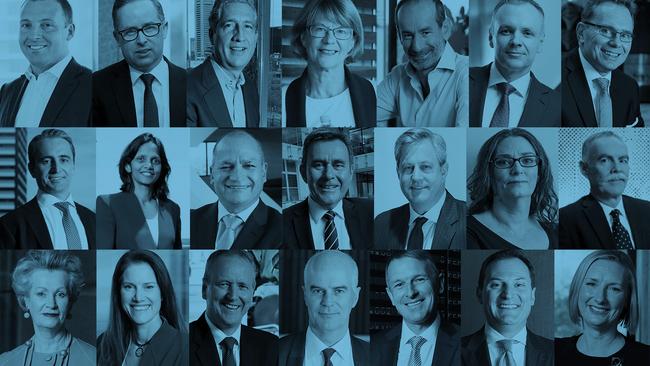
In our annual a survey of business leaders, the top executives maintained that economic growth, a national energy policy and most of all long-term stability were the key agenda items.
In the wake of the financial services royal commission, the survey revealed an almost religious devotion to customers as the route to prosperity for corporate Australia.
Delivering customers what was promised is seen as the key way to restore trust.
Business leaders are also beginning to see signs of wages growth across their workforce, particularly as labour markets tighten, although wage rises are not even distributed across the economy.
At a time when trust in big business and government is at all-time lows business chiefs want leadership from Canberra with an emphasis on bipartisan energy reforms and long-term policy to improve the economy.
These were our five big questions for 2018:
- What should be the key issues in the next federal election campaign?
- What use are you making of customer and company data and how are you collecting it?
- What are the key challenges for your company next year?
- How can big business regain community trust?
- What cost pressures are hitting your company? How are they being offset and do you see any pressure to lift wages? If so, how much?
-
Peter Allen, Scentre | Mark Allison, Elders | David Attenborough, Tabcorp | Marnie Baker, Bendigo & Adelaide | Brad Banducci, Woolworths | Andrew Bassat, Seek | Brian Benari, Challenger | Inaki Berroeta, Vodafone | John Borghetti, Virgin | Steven Cain, Coles | Frank Calabria, Origin | Alberto Calderon, Orica | Michael Cameron, Suncorp | Michael Clarke, TWE |Peter Coleman, Woodside | Matt Comyn, CBA | Dean Dalla Valle, Pacific National | Rene Dedoncker, Fonterra | Richard Deutsch, Deloitte | Jeff Dimery, Alinta | Craig Drummond, Medibank | Shayne Elliott, ANZ | Francesco Ferrari, AMP
-
Peter Allen | Scentre
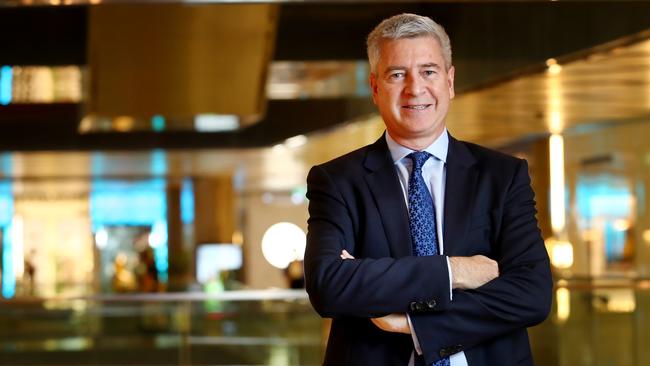
What should be the key issues in the next federal election campaign?
Long-term fiscal management of the country so we continue to attract investment, remain competitive and develop the skills and capabilities we need to enable these outcomes.
What use are you making of customer and company data and how are you collecting it?
Delivering a superior customer experience across our portfolio of 41 living centres is dependent on access to dynamic customer insights. We have limited collection of individual customer data however we analyse anonymous customer data for the purpose of improving our decision-making and planning to deliver a consistently superior customer experience.
What are the key challenges for your company next year?
To ensure we have the right product mix in each of our living centres and continue creating places that our customers want to visit, rather than have to visit. Understanding the true value of our space that we lease to retailers to conduct and grow their business as we know physical locations influence sales in-store as well as online.
How can big business regain community trust?
Deliver what the customer wants. Be customer focused and prove that we add value in providing our products and services. Ensure we have a long-term sustainable business that satisfies the needs of multiple stakeholders.
What cost pressures are hitting your company? How are they being offset and do you see any pressure to lift wages? If so how much?
We are like any other businesses that seeks to allocate capital efficiently to optimise our existing business whilst innovating in new areas. Our average pay increase in 2018 is in line with inflation. We are having more conversations with our leaders about setting higher standards for performance.
-
Mark Allison | Elders
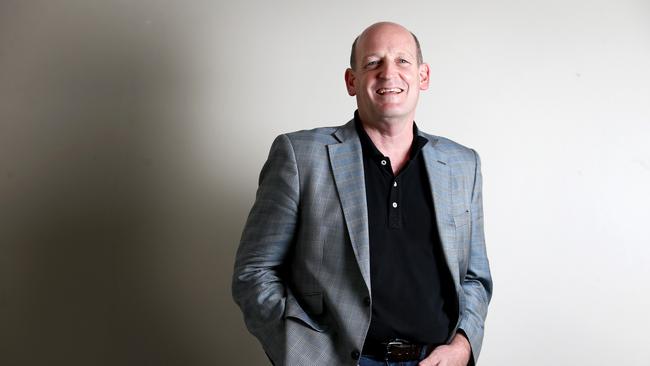
What should be the key issues in the next federal election campaign?
The key issues should focus around sound economic and social management constructed around equipping and investing in Australian infrastructure, education and health towards a longer-term national vision, rather than playing off short-term political points around vested interest and minority groups and agendas.
What use are you making of customer and company data and how are you collecting it?
At Elders, we are increasingly using data analytics to more efficiently and effectively allocate our cost, capital and human resources. This allows us to better understand our clients’ needs and to tailor our product and services more to their specific needs.
What are the key challenges for your company next year?
The key challenge at Elders will be to maintain our clients’ needs at the centre of our focus while continuing the above 20 per cent return-on-capital growth that we have achieved over the past four years. We also would like to further build on our digital and technical growth initiatives while maintaining the growth in our more traditional business areas.
How can big business regain community trust?
Values-based authentic leadership is a good starting point. Most organisational behaviour is modelled off the leaders in the business. I strongly believe in the old line: “the standards you set, are the standards you get”; so fundamentally it starts at the top.
What cost pressures are hitting your company? How are they being offset and do you see any pressure to lift wages? If so how much?
Under the Elders business model, there is not one specific area of cost increase hitting the business. We aim to recover CPI increases each year through efficiencies and reallocation of costs from low return on capital areas to higher return on capital areas. This is a very important discipline for a business like Elders.
-
David Attenborough | Tabcorp
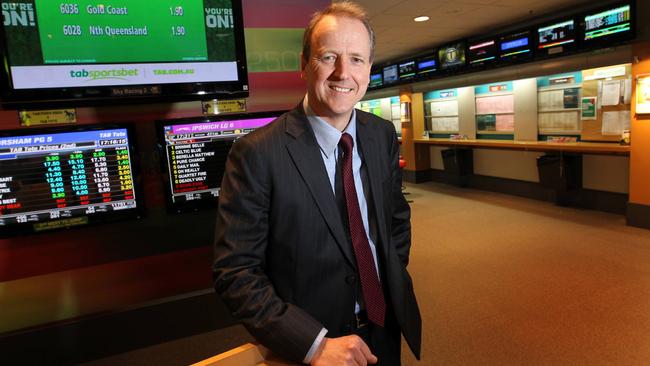
What should be the key issues in the next federal election campaign?
There is a real appetite in the community for constructive politics to solve the right approach to big issues such as energy cost and supply, climate change, sustainable economic growth and Australia’s position within the changing global environment.
What use are you making of customer and company data and how are you collecting it?
We are harnessing our insights to give our customers more appropriate and tailored offers, as well as using data to manage our regulatory requirements, to determine market pricing and to help identify potential problem gambling play.
What are the key challenges for your company next year?
We have three main priorities. Firstly, to deliver a successful integration of Tabcorp and Tatts, including the planned synergies. Secondly, to continue to invest in the growth and digital transformation of our three businesses. And finally, to ensure an aligned culture underpinned by our new vision, values and purpose of “excitement with integrity”.
How can big business regain community trust?
Regaining the community’s trust involves companies recognising that doing the right thing by customers, stakeholders and the community is good business. And as big business delivers on this, it’s then about making sure the community understands the contribution that business makes to our success as a nation.
What cost pressures are hitting your company How are they being offset and do you see any pressure to lift wages? If so how much?
Our productivity has been improving and we can expect further benefits from synergies in coming years. That said, we’re focused on investing in our long-term future, and we continue to have pressure to invest in areas such as our digital transformation. Our advertising and promotions spend has been growing strongly in an aggressive market. Recent regulatory changes should, over time, lead to a more restricted and rational approach in the market. Relatively low unemployment and competition for talent in discrete sectors will mean there is pressure to lift wages. We continue to align our remuneration to market as appropriate.
-
Marnie Baker | Bendigo and Adelaide Bank
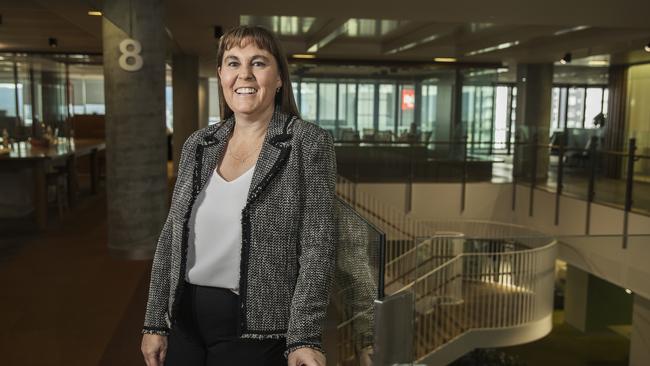
What should be the key issues in the next federal election campaign?
Our bank remains supportive of policies and initiatives that lead to an environment where consumers and business owners and communities can succeed. For example, we strongly believe creating an environment that encourages competition in banking will help improve outcomes for all Australians, both those living in the major cities as well as regional and rural Australia. A more level playing field in banking, achieved by removing some of the artificial benefits the major banks enjoy through regulation, would promote greater competition in financial services – and ultimately enable better customer choice and outcomes. Various financial services inquiries have found that competitive neutrality is an important regulatory principle. We are not supportive of any changes, regulatory or otherwise, that will negatively impact on the ability of a customer to have access to choose.
Having the right population, infrastructure and social policies, as well as policy that backs Australian business, especially small businesses, is critical to a strong Australian economy. The current debate on population growth and overcrowded capital cities would benefit from considering the role our regional centres can play in shaping a thriving, future Australia. Our strategy and vision to be Australia’s bank of choice does not change nor is it influenced by one party over another. Our bank has an important role to play in enabling success for all Australians, and our unique banking model, size, capability and footprint comprises the right ingredients to continue customer growth and be an even more important part of a strong Australian economy.
What use are you making of customer and company data and how are you collecting it?
Like any smart organisation in the 21st Century, data helps us to better understand our customers and improve our business operations. Our position as one of Australia’s most trusted brands, coupled with our differentiating technology and fintech partnership strategy, places us in a strong and unique position to take advantage of the opportunities ahead. Our strategy prepares us for the future of banking. With the invaluable knowledge data provides, we can help Australians achieve their financial goals, understand what makes Australian communities tick, and what makes for strong, long-term partnerships. This means everyone connected with our business can continue to grow and thrive, no matter the conditions.
We collect data from a range of sources, including our banking systems, application processes, transactional activity, and external reference data, and we are well engaged with our customers through regular touchpoints in the form of surveys and online community forums to meet their expectations. We track measurements like ratings and scores and drill down with our customers as to why they’ve ranked us a certain score to ensure we are continually aware of their pressing needs and desires. This information is essential in providing a hyper personalised customer experience, influences our business strategies and the products and services we provide, while also fulfilling our regulatory obligations. Fundamental now, technology will be even more critical to the success of any organisation, banking or otherwise. Within our industry, we will see other financial models continue to evolve such as digital banks, fintech innovation, automation and Artificial Intelligence in home lending. As these initiatives become more widely used, they will need to be underpinned by consumer trust and confidence to thrive beyond their inception. Open banking will be yet another innovative way for consumers to receive hyper-personalised experiences from financial institutions, and we are well placed to take advantage of the opportunity it presents.
What are the key challenges for your company next year?
One of the fundamental causes of the current crisis in financial services in Australia is the lack of true competition in Australian banking. The harm caused by the lack of a level playing field in relation to prudential capital and funding costs has allowed the major banks to focus so much on shareholder returns at the expense of customers. If trust in banking is to be restored, it is crucial that organisations with different objectives and standards are able to compete on a level playing field and customers can choose accordingly. We wouldn’t want to see any recommendation coming out of Hayne’s final report that reduces the opportunity for customer choice.
It is also important that banks of different sizes, appealing to different markets and segments, are encouraged and able to compete. Our bank is here, equipped, willing to compete and offer Australians a better option as Australia’s bank of choice. Approaching any challenge with integrity is paramount. Integrity is one of the cornerstones of our business and is in fact, one of our business’ corporate values. It means we focus on building a culture of trust and that we are open, honest and fair.
How can big business regain community trust?
For years banks were considered among the most trusted institutions, but the problem is trust can have many faces. The specific trust placed in banks over time has generally referred to people trusting banks to keep their money safe and protect their privacy. The missing piece, which places the industry at the crossroads today, is people trusting banks to do the right thing.
In our globally integrated instantaneous digital world, trust is the new currency. Without it, service economies can’t function, and it’s the companies that misuse personal data or abuse trust that take the biggest hit. It is for this reason that credibility, transparency, integrity and trustworthiness are key leadership competencies of the new global economy. Trust must be a bottom line requirement for all CEOs. Put simply, it’s a hard-economic driver and not a soft value metric. And as other financial models continue to evolve and become more widely used, they will need to be underpinned by consumer trust and confidence to thrive beyond their inception. The reality is, trust is never an end unto itself. There’s always more to do and ways to improve. It’s not good enough to hide behind an updated privacy statement, a values commitment or service promise on a website. Whilst it’s important to state your intent, it means nothing if you don’t deliver on your commitment with integrity. You must be seen to be doing the right thing, in the right way, for the right reasons, in the way that you said you would. Upholding this commitment is essential for all corporations.
What cost pressures are hitting your company? How are they being offset and do you see any pressure to lift wages, and if so, how much?
While about 80 per cent of our funding is sourced from retail deposits – the highest among Australian banks – we are still impacted by continued global volatility, and the resulting increase in cost of funding. Compliance and regulatory costs have also continued to increase for our business and the industry as a whole. But more than that, we know the greatest impediment to our business today is the lack of competition in Australian banking, and we welcome changes to level the playing field for standardised banks. Aside from a standardised capital risk weighting, we are supportive of an open banking regime, which will also encourage improved choice for customers and fairer competition for banks.
Brad Banducci | Woolworths
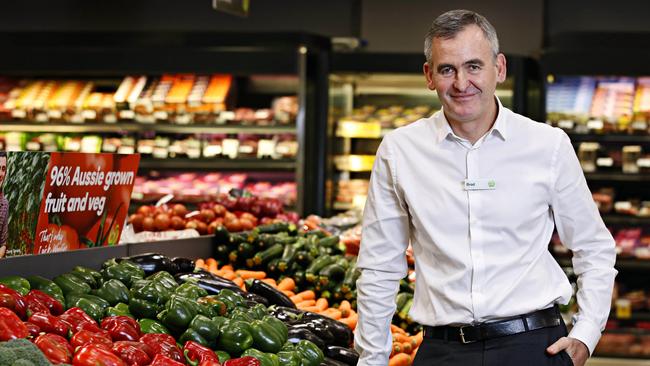
What should be the key issues in the next federal election?
While there are a number of issues facing the nation currently, for us the cost of living pressures our customers are experiencing is a key focus area. As I mentioned last year, sustainability also remains a key issue for us. The phase out of single use plastic bags was only a first step and we all need to work together to deliver on the “circular economy” to ensure a more sustainable future for Australia.
What use are you making of customer and company data and how are you collecting it?
We are very clear that the core use for our customer data is to enhance how they interact with us and ensure the experiences they have are as frictionless and easy as possible. It’s also important that it is used to deliver personalised convenience, value and inspiration. In terms of our business data, the focus here is on improving underlying business processes and making things as simple as possible for our teams and also our supply partners in order to help serve our mutual customers better.
What are they key challenges for your company next year?
A key ongoing challenge is meeting our customers growing demand for convenience, both in terms of how they shop but also how they eat. We’ve come a long way in 2018 in terms of further improvements to our pick-up and delivery services, as well as the introduction of express delivery to a number of our supermarkets, but there is more work to do to continue to meet the changing needs of our customers in this space. The other big challenge is working hard to improve our key business processes to offset wage and input cost increases.
How can big business regain community trust?
In my view, “big business” needs to behave a lot more like “small business” and be focused on the specific needs of the local communities in which they operate. We are trying to do this via living our Group Purpose of “We Create Better Experiences Together” and our Food Purpose of “We Bring a Little Good to Everyone Every Day”. Trust is not a right, but is earned based both on what we do and also what we choose not to do.
What cost pressures are hitting your company? How are they being offset and do you see any pressure to lift wages and if so by how much?
We are in the process of increasing wages and this is a good thing. Team wellbeing is also a key focus and we break this down into physical safety, mental health and financial security. Outside of wages, we have also increased our team discount from five to 10% on our own brand products, increased paid parental leave from 6 to 12 weeks and we were the first retailer to introduce paid superannuation for up to 12 months for those on parental leave. We’re working hard to offset electricity cost pressures by being much more sustainable in our energy demand management and generation and are making good progress in this regard. For example by the end of FY19, we will have close to 100 stores with solar panels installed.
-
Andrew Bassat | Seek
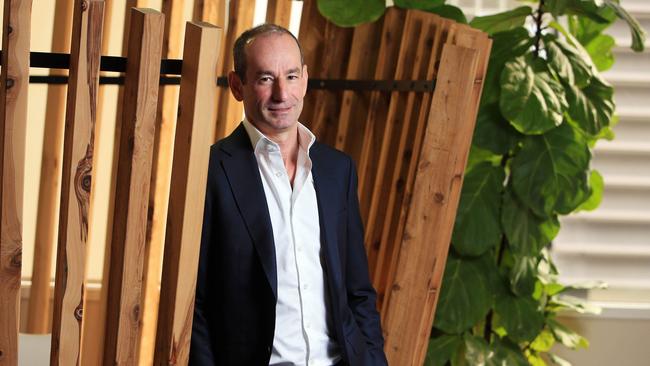
What should be the key issues in the next federal election campaign?
Big policy issues around the economy, education, infrastructure, climate change and immigration and also policies that support investment in technology and re-skilling of the workforce.
What use are you making of customer and company data and how are you collecting it?
The data we capture is used solely for the purpose of improving outcomes for the people that provide that data.
What are the key challenges for your company next year?
We are focused on investing to capitalise on large human capital opportunities across our major markets.
How can big business regain community trust?
Have a longer-term focus and a clearer purpose that extends beyond financial outcomes.
What cost pressures are hitting your company? How are they being offset and do you see any pressure to lift wages? If so how much?
World class talent delivers superior outcomes, so we do not worry too much about offsetting these costs.
Brian Benari | Challenger

What should be the key issues in the next federal election campaign?
The wave of people reaching retirement is one of the biggest fiscal and social challenges facing Australia, so building a sustainable retirement income system needs to be an ongoing priority for government. Our super system is worth around $2.8 trillion, we have the fourth largest pension market in the world, and our superannuation assets are expected to double in the next 10 years. We have done a great job of helping Australians accumulate assets and build their savings for retirement, but more focus still needs to be directed at the retirement phase of superannuation to ensure retirees have the support to make their retirement savings last as long as they do.
What use are you making of customer and company data and how are you collecting it?
This year we have undertaken detailed research with our customers and advisers to better understand the needs and experiences of pre-retirees and retirees. We’re using that research to refine our products and communications and inform the debate around funding a better retirement lifestyle for Australian retirees.
What are the key challenges for your company next year?
I expect 2019 will bring significant change to the financial services sector across many fronts, including regulatory change, digital disruption and ongoing market volatility. Challenger will see impacts on our distribution channels from mergers and regulatory change in the wealth industry, and new rules for pooled lifetime income products will open up the market bringing new competition. We have a track record of benefiting from periods of intense change, and we are well positioned to capture the opportunities that change creates.
How can big business regain community trust?
Customer trust in the financial advice sector, and financial services more generally, is facing real challenges. This is an issue the whole sector must address through not only putting the customer’s interests first but also being able to communicate and demonstrate the benefits that each business brings to the community.
What cost pressures are hitting your company? How are they being offset and do you see any pressure to lift wages? If so how much?
Over the past decade Challenger has been able to harvest the benefits of scale through technology and operational leverage driving cost to income to a record low. However, the current period of record low interest rates, low growth, and below-average inflation has meant that revenue growth continues to be more challenging, a dynamic which is being experienced across many sectors. As a result, cost management through productivity improvements remains high on the agenda however attracting and retaining top talent is also critical to our success. Therefore, performance and reward practices continue to target key talent who can drive key outcomes for our customers, employees and our business.
-
Inaki Berroeta | Vodafone
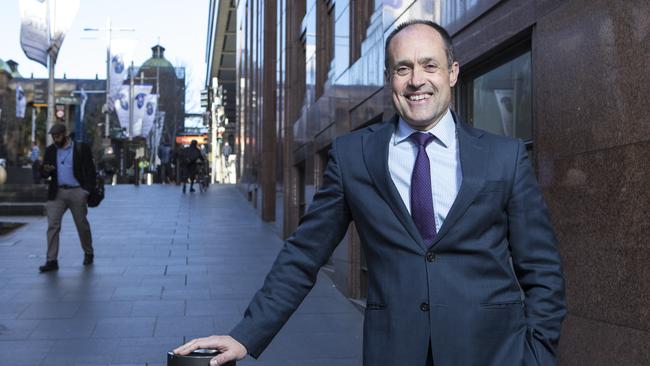
What should be the key issues in the next federal election campaign?
Everyone knows that businesses need to keep listening to their customers. I think Canberra is learning that it should also be listening to its customers – Australian voters and taxpayers. That’s not a comment about any particular political party, it’s a comment that Canberra as a whole risks slipping out of touch. Australia really needs and wants its politicians working together to solve the difficult issues. I think recent events in the housing market will also be a significant focus as people start to worry whether the economy is really as robust as Australians have come to expect. We still see a strong consumer retail market but it’s important to continually anticipate future challenges and make sure clear plans are in place to address them.
What use are you making of customer and company data and how are you collecting it?
We use anonymised data (so that no-one can identify individuals or personal data), especially network traffic trends, to continuously improve services and products for our customers. For example, we can see overall network traffic moving from the suburbs into the CBDs in the morning and returning in the afternoon and evening along major transport routes. This informs future network upgrade and investment plans to ensure we have coverage and capacity in the right places. We can also see the huge explosions in data consumption, largely driven by video streaming, and this helps us to understand the inclusions customers want in their plans. For example, earlier this year we launched Australia’s first endless mobile data plans in response to continuing increases in data usage. The protection of customer privacy is of the highest priority to us and we treat personal data with the upmost respect.
What are the key challenges for your company next year?
2019 is going to be a very big year. Subject to approvals, we will complete the merger between VHA and TPG, creating a stronger competitive force in the Australian telecommunications industry. By bringing together two complementary businesses, one strong in mobile and one strong in fixed, we will have increased scale to invest in networks, products and services, and customers will be the big winners.
How can big business regain community trust?
Australians are very smart, and quite rightly expect to be treated fairly. They know when someone isn’t doing the right thing by them. Businesses must, in everything they do and every decision they make, do the right thing by customers, the community, their employees and shareholders. And for there to be a meaningful shift, this culture has to start at the top with CEOs and senior leaders. We’ve made some significant moves on transparency through initiatives such as our $5/day international roaming which is now available in 80 countries, but there is always more to do.
What cost pressures are hitting your company? How are they being offset and do you see any pressure to lift wages. If so how much?
Actually, one of the most worrying costs and increasing cost pressures on our business is regulatory and government costs. Telecommunications customers would probably be surprised to know that there is a contract which has never been made public under which our customers and taxpayers are required to subsidise Telstra. This adds up to over $350m a year which goes directly to Telstra largely for outdated copper and payphone services. We would be very happy to contribute to a technology-neutral, competitive scheme which delivers real benefits to regional Australia, however we take issue with having to collect money from our customers and pay millions of dollars a year into an arrangement which lacks transparency and accountability.
In terms of wages, we pay our employees well, in many cases above the market rate, and we’ll continue to ensure our people are remunerated fairly in line with their skills and experience.
-
John Borgehetti | Virgin
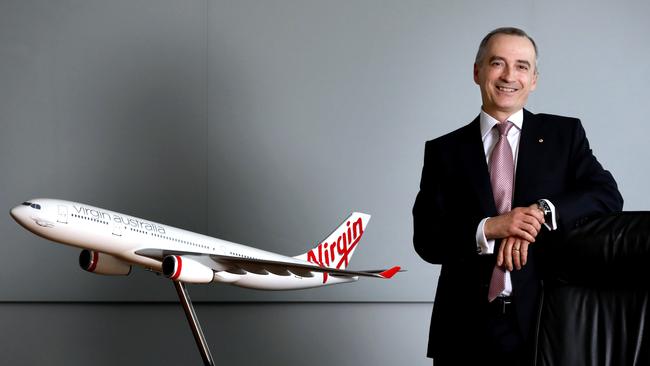
What should be the key issues in the next federal election campaign?
Australians and Australian businesses are responsible for driving future economic growth, but the Federal government will have important role to play in this growth through its policies and legislative agenda. As we move into the upcoming election cycle, all parties and politicians should have clear ideas about how they will work with businesses to ensure we are making the most of our talented workforce.
In an increasingly globalised and automated world, the ability of our population to solve problems and create new growth is one of Australia’s greatest assets and a key opportunity for our future economic success. More specifically, it would be good to see a strong focus on cooperation between the public and private sector, including joint investment in training and upskilling.
Creating and executing a cohesive vision for our transport infrastructure. Governments must work closely with the end users of infrastructure, including businesses and individuals, to ensure that infrastructure is fit for purpose and meets long-term needs.
What use are you making of customer and company data and how are you collecting it?
We see a tremendous opportunity to use data to create rewarding, personalised travel experiences for our customers.
We’re using one of the world’s leading artificial intelligence tools to tailor our frequent flyer point redemption offers to our customers. We can offer our customers the opportunity to use their points for almost anything they want, from flights to Hong Kong to golf balls to gelato.
We collect and manage data in a secure, transparent way with a relentless focus on privacy, and with the support of a dedicated privacy team within our business.
What are the key challenges for your company next year?
Managing the risk of volatile fuel prices, which we are addressing through a strong and proactive hedging program.
Ensuring that we are taking full advantage of the growth potential offered by Australian tourism. We’re doing this by building a strong foothold in the Asian aviation market through our flights from Hong Kong and our codeshare partnerships.
How can big business regain community trust?
By displaying a genuine commitment to integrity and honesty in all activities, and by being willing to proactively address areas for improvement.
What cost pressures are hitting your company? How are they being offset and do you see any pressure to lift wages? If so how much?
We are being proactive in addressing rising costs – such as fuel and airport fees – to the extent that we can. We have a strong, proactive fuel hedging program in place. We are also calling for improved regulation of the fees charged by airport operators, many of whom currently operate in a monopolistic environment that impacts ticket prices for Australian travellers.
-
Steven Cain | Coles
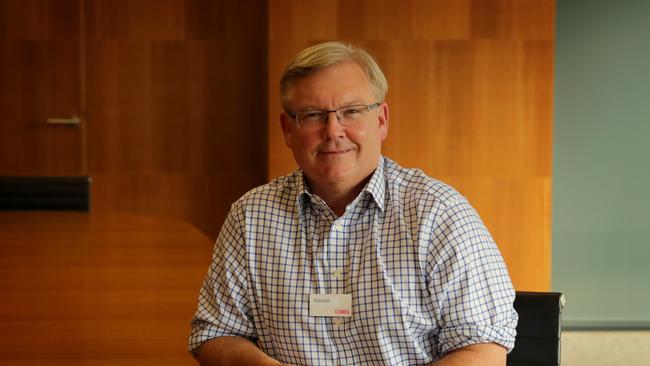
What should be the key issues in the next federal election campaign?
Economic growth: Maintaining Australia’s solid economic growth track record requires government policies that increase the underlying productivity of the economy. Four priorities in this regard are:
Productivity and innovation: After several years of subdued wages growth, it is imperative that government does all it can to continually improve productivity so that all stakeholders may share in the benefits of economic growth.
Cost of living pressures: we are committed to continue delivering value to our customers, but the growing strain on household budgets requires a concerted effort across all parts of the economy, particularly in areas that account for a large proportion of living expenses such as utilities and health care.
Transport infrastructure: continued economic growth requires targeted public funding for and timely delivery of high priority transport infrastructure.
Tax reform: Proposals to make the corporate tax rate more internationally competitive would help Australian businesses not only to attract more investment capital to fund growth, but also lower the hurdle rate of return for viable investments.
What use are you making of customer and company data and how are you collecting it?
Customer data collected through Flybuys helps us to assess new store locations and make ranging decisions to meet the needs of local customers, as well as provide more relevant offers to customers. Each week, we survey 35,000 customers and hear from another 20,000 through social media and 25,000 via our Customer Care team. We use this information to help guide our thinking and assess how well we are executing against our aim of making life easier for our customers.
What are the key challenges for your company next year?
Cost of living pressures, low real wage growth and a slowdown in the housing market remain headwinds for consumer spending. The impact of drought on fresh produce and some agricultural commodities is also expected to add to input costs, while the competitive landscape continues to rapidly evolve in response to the entrance of new offshore competitors and the growing importance of technology in all aspects of retailing.
How can big business regain community trust?
Trust takes a very long time to build and can be lost very quickly. Therefore it’s not enough to treat Corporate Social Responsibility as simply an add-on to your business. It needs to be embedded in everyday processes that meet and exceed community expectations. At Coles we have worked hard to earn the trust of customers on delivering value by lowering the price of a weekly shop every year for the past decade. At the same time we have committed ourselves to serving the communities in which we operate through initiatives like our partnership with SecondBite our $50 million Coles Nurture Fund which provides grants and interest-free loans to foster innovation in food production. We have also done a lot of work to strengthen our relationships with suppliers, including through our work in formulating the Food and Grocery Code of conduct to which we were among the first signatories in 2015. At the same time, our own Supplier Charter, which has been in place since 2014, is alone in the retail space in including an independent arbitration process that is both binding on us and carrying no cost to suppliers.
What cost pressures are hitting your company? How are they being offset and do you see any pressure to lift wages? If so how much?
Like all Australian businesses we are seeing higher energy costs, the impact of which we are seeking to reduce with more efficient store design. We have called out that we will face higher wage costs this financial year as a result of our new enterprise agreement, which came into effect in April. Our Supermarkets store team enterprise agreement is in place until April 2020 and increases in wage rates are based on the annual increase applied to the General Retail Industry Award by the Fair Work Commission. Coles has also seen some increase in food commodity, some of which we are absorbing to reduce the impact on customers at the checkout and make their lives easier. We are also reducing costs throughout our supply chain via the use of technology to better plan transport movements, and the two new automated ambient distribution centres we will build in NSW and Queensland over the next five years will also allow us to reduce costs and improve stock availability for customers.
-
Frank Calabria | Origin
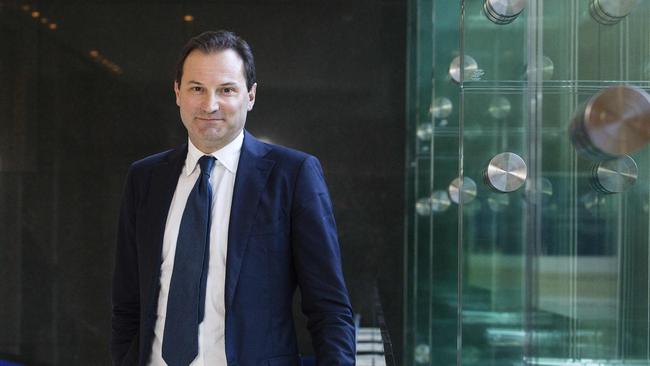
What should be the key issues in the next federal election campaign?
We urgently need coordinated energy and climate policy to guide the economy’s transition to cleaner energy at least cost to the community and with no impact on reliability. This is not just important for our sector, but for our whole economy.
I think it’s clear that Australians also want to see more investment in our public institutions that go to the nation’s wellbeing, such as education, healthcare and other social services.
What use are you making of customer and company data and how are you collecting it?
With an increasing number of customers now with smart meters, we’re getting reads on energy usage every 30 minutes amounting to more than 17,500 datapoints a year per customer. The value of this data lies in how we use it – to help us be more efficient, better service our customers and create new and more targeted products that help customers control their energy use and spend. Companies that get the most insights from their data will be more successful in an increasingly digitised world.
What are the key challenges for your company next year?
Continuing to navigate the major transition underway in energy markets in a way that maintains affordability and reliability for customers. We’re excited to get back on the ground in the Northern Territory to continue our exploration and appraisal of Beetaloo, a potentially material gas resource, and in Retail we’ll be looking to transform that business, so it is better positioned to anticipate and respond to change.
How can big business regain community trust?
There is no shortcut, trust must be earned. As leaders, we need to be connected to the concerns of the community and demonstrate how we deliver value to them. My priority is to make sure our 4.2 million customers have access to reliable, affordable and cleaner energy, to keep our workforce safe and to share some of the value we create through our philanthropy and community investment activities.
What cost pressures are hitting your company? How are they being offset and do you see any pressure to lift wages? If so how much?
Strong competition and the potential for reregulation of electricity prices will all put increasing pressure on our retail business, so we’re looking at how our business changes to respond to these challenges. In our gas business, we’re already well down the path of significantly reducing upstream costs.
-
Alberto Calderon | Orica
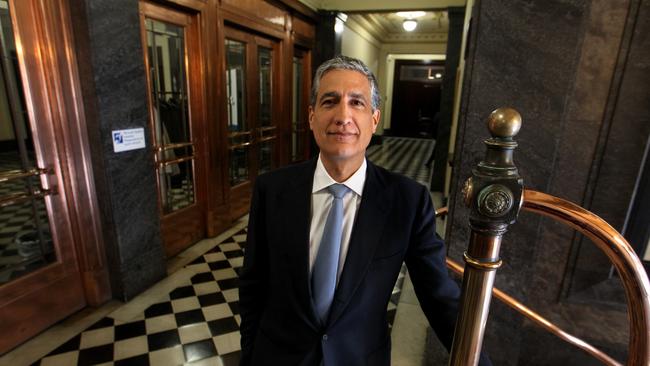
What should be the key issues in the next federal election campaign?
We have seen politicians on all sides drawn to the issues of the day rather than the long-term needs of the country. Regardless of which political party wins office, for the foreseeable future the government’s key priority should be to ensure the continued growth of the economy and living standards. I have been vocal in my belief it is not sustainable to rely on government expenditure for growth. Statistics show that Australia has one of the lowest levels of private investment/GDP ratio in 60 years. We need to revive investment from the private sector and this requires changes to the way our taxation and regulatory systems encourage investment. The recent tax relief for small and medium enterprises will have a positive impact and this is welcomed. For corporations, my firm belief remains that targeted tax relief incentivising R&D investment will benefit all Australians. It will create jobs by incentivising companies to build new plants and create new technologies and increase wages and living standards by lifting productivity and innovation.
What use are you making of customer and company data and how are you collecting it?
We’ve developed new products to help our customers use the huge volumes of data they collect at mine sites to improve safety, productivity and regulatory compliance. Our BlastIQTM platform collects data from existing systems and puts the aggregated information and analysis in hands of the teams that manage the blasts.
What are the key challenges for your company next year?
After several years of external headwinds, our challenge this year is to make the most of the improved outlook. We will also be accelerating our response to the opportunities that automation and big data are bringing to the mining industry.
How can big business regain community trust?
We need to take a more proactive stance to identifying potential issues and responding before they become a problem for the community. We can and must influence our respective industries to set strong standards and to then hold ourselves to those standards. A race to the bottom in search of short-term profits helps no one in the long term.
What cost pressures are hitting your company? How are they being offset and do you see any pressure to lift wages? If so how much?
As is the case for many businesses and households across Australia, we are finding ways to offset the impact of higher gas and energy prices. We are hoping that the important conversations happening in that area will deliver outcomes that all parties are happy with.
-
Michael Cameron | Suncorp

What should be the key issues in the next federal election campaign?
Maybe I’m being too optimistic but both parties should be running on a platform of stability in leadership, while presenting a long-term vision for the country. Good Government has been sacrificed for political ambition for too long, which has stifled the country’s progress and meant we haven’t tackled important challenges such as energy policy and fair tax reform. These solutions require considered discussion and sensible debate – that can’t be reached when parties are trading three-word slogans. Personally, I believe we need a national discussion about how to significantly enhance disaster resilience and mitigation, particularly in cyclone-prone areas of the country. There is much more business and government can be doing together, to build resilient communities.
What use are you making of customer and company data and how are you collecting it?
The more we know about our customers the better the service we can offer them. Data is allowing us to design products and customise offerings to suit individual customer needs.
Data combined with AI is helping us to streamline processes and deliver fast, convenient services, like our zero-touch motor claims, which has now reduced the time it takes for customers to have a motor claim processed from 48 hours down to just 5 minutes.
Data is an important asset for companies, and it comes with big responsibility, that’s why at Suncorp data and security need to go hand-in-hand.
What are the key challenges for your company next year?
The key challenges for the year ahead are responding to the pace of disruption, strengthening community trust and future proofing our workforce. The pace of disruption will only accelerate and customer expectations around speed of service, convenience and personalisation of products will only increase. In response, we have invested in digitising the customer experience to provide greater awareness of our products, easier access to them and making them better tailored to customer needs. The additional regulatory and political scrutiny that has come as a result of the royal commission, I have always believed to be an opportunity to restore trust and deliver better customer outcomes. That said any regulatory change will need to be implemented in a considered way across the industry to avoid unintended consequences that could negatively impact customers. While we cannot yet know the extent of the reform that will result from the royal commission, the strategic approach we have been implementing over the past two years to put the customer at the centre of our business has proved both timely and beneficial. We are also working hard to future-proof our workforce. We want to help our people build the skills they need for the jobs of the future. Technology is changing the way we work and through initiatives such as our Future Ready program, we are helping our people adapt to these changes, through retraining and re-skilling. This is a challenge that businesses in all sectors are facing.
How can big business regain community trust?
A big first step, not just for us, but for the industry, was to acknowledge that we don’t always get things right. And in that respect the royal commission has been a humbling experience. At Suncorp our culture of continuous improvement has meant that where we’ve become aware of issues we have acted on them and made changes. It’s also vital that businesses demonstrate to the community the value they deliver. For Suncorp, this means being there for our customers to help them rebuild when things go wrong, and also having a long-term view by helping our communities become more resilient to severe weather. By offering protection from many of the risks that exist day to day, insurance lets us live our lives with a sense of freedom that we would not otherwise have – we need to not only deliver that value but also articulate what it brings to communities.
What cost pressures are hitting your company? How are they being offset and do you see any pressure to lift wages? If so how much?
We continue to transform the way we work and the way we deliver value for our customers. Because of this we are seeing a shift in our expense base towards technology and digital spending, which is allowing us to enhance customer experience and drive improvements to our internal processes. In financial services we have experienced an increase in regulatory and compliance costs. This will continue to be driven by the outcomes of the royal commission, as well as other regulatory activity. We see wage pressures occurring as a result of a competitive labour market and there’s been seeing increased demand across financial services for some skillsets, in particular, those with regulatory and compliance expertise.
-
Michael Clarke Treasury Wines Estates
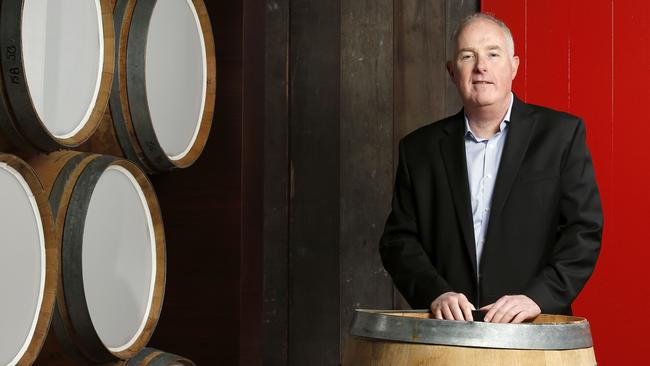
What should be the key issues in the next federal election campaign?
Sustainable government – in business, we strive to deliver sustainability in everything that we do, whether that is the environment, sustainability in strategies and results, sustainability in succession of leaders. Political parties should give it a go.
What use are you making of customer and company data and how are you collecting it?
In each of our markets we data mine and triangulate information and data that we get from customers and third-party organisations. We reconcile this with data that our teams collect in each market to gain a deeper understanding of market trends, competitor trends, consumer trends – and we then make a call on what we will do to participate, or drive a trend harder, or drive a different trend where there is a greater opportunity
What are the key challenges for your company next year?
Simplify how we operate – so that we can grow faster – by focusing the team on interesting and value enhancing efforts and outcomes. Making sure we don’t have “cottage industries” and bureaucracy.
How can big business regain community trust?
Demonstrate that you care – be responsible, show that you are responsible and that you care. Be a part of the communities that you do business in. This includes responsible marketing, responsible consumption and education programs, and volunteering programs, where staff engage in programs to support the communities in which we operate.
What cost pressures are hitting your company? How are they being offset and do you see any pressure to lift wages? If so how much?
The big opportunity is to simplify how we operate – remove duplicate processes – focus employees on higher value-add projects and processes. It makes work life better and is value enhancing to the individual and the company.
Peter Coleman | Woodside
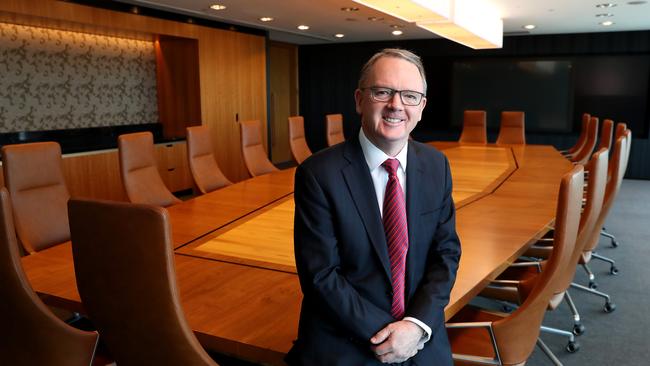
What should be the key issues in the next federal election campaign ?
We need some vision from our leaders and willingness to tackle the big challenges across the economy, productivity, climate, energy. It’s time to move away from the politics of “no” and work to establish a common purpose.
What use are you making of customer and company data and how are you collecting it?
We use data analytics to support our operations but that’s our own data, harvested from sensors on our gas production facilities and from inputs from our staff. That data helps us make better decisions and predict and avoid disruptions to our operations. We have given our staff access to Willow – that’s the name we’ve given to the avatar that is using our artificial intelligence capabilities to “learn” better ways of working.
What are the key challenges for your company next year?
We’ve set ourselves ambitious timelines for our Burrub Hub growth projects in northern Western Australia. We’ve made great progress so far – and the pace is going to pick up another notch in 2019 as we head towards final investment decisions from 2020 on our Scarborough and Browse projects. We’re progressing two big developments in tandem, so it’s all hands on deck – this is $30 to $40 billion worth of investment. We know we can deliver both developments and that there will be strong global demand for the gas.
How can big business regain community trust ?
The reality is we are part of the community – and perhaps we need to tell that story better. We employ thousands of people, support community organisations and provide products and services the community needs. It helps within a company if staff have a clear understanding of the company’s values. Our staff know we expect them to do the right thing every time.
What cost pressures are hitting your company? How are they being offset and do you see any pressure to lift wages? If so how much?
We’re seeing modest wage growth in our industry, of 3 to 4 per cent, which is just slightly above inflation. Yes, the resources cycle has picked up a bit but this doesn’t look anything like the intense competition for workers that Western Australia experienced during the last boom.
-
Matt Comyn | Commonwealth Bank
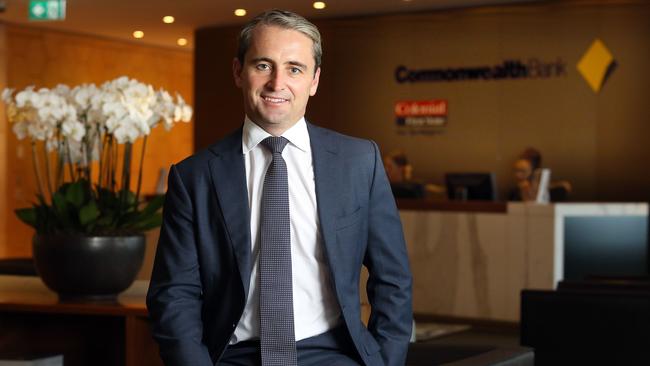
What should be the key issues in the next federal election campaign?
Clearly the first priority has to be policies that build on Australia’s record period of economic growth. This will allow us to prioritise new investments in health, education, transport and housing that are inclusive and ensure everyone benefits from the nation’s economic success.
What use are you making of customer and company data and how are you collecting it?
Data and analytics is an important lever to improve the customer experience, enhance our risk control environment and drive productivity. It’s one of the most important capabilities we need to improve the experience and service we are offering our customers. High data integrity is a prerequisite for analytics to create value. We are continuing to invest in improving our data environment including uplift in our data management capabilities in data governance, quality, privacy and sharing to meet rising customer expectations and address existing and emerging regulatory obligations.
What are the key challenges for your company next year?
For CBA we are continuing to work hard to create a simpler, better bank to allow us to focus on rebuilding trust with our customers and the community. For customers we need to demonstrate with actions. This requires continued leadership in service and digital innovation, and a need to make a tangible, positive impact on our customers’ financial wellbeing.
How can big business regain community trust?
We’ve invited our customers and the community to judge us by our actions, not our words. We’re determined to demonstrate to our customers, employees and the community that we are on their side but we know it’s a long process and we need to work hard to achieve this.
What cost pressures are hitting your company? How are they being offset and do you see any pressure to lift wages? If so how much?
Our cost pressures reflect a mix of legacy, regulatory, compliance and technology investment needs, the effect of which are being amplified by the lower growth environment. One of the immediate areas of opportunity including reducing technology costs of run and change. We also need ensure that the one-time investments required to improve our operational risk and control environment do not become a persistent part of our cost base.
-
Dean Dalla Valle | Pacific National
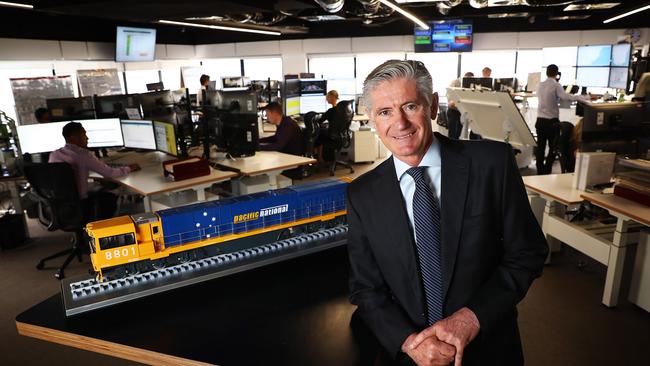
What should be the key issues in the next federal election campaign?
Uncertainty around energy policy continues to be a critical issue for both business and Australian households. In the lead up to next year’s election both parties will need to improve balancing of policy objectives and clearly explain to voters how they will both safeguard jobs and the economy while committing to effective energy policy. The absence of clear direction puts a handbrake on investment. I worked in mining and energy around the world for over 40 year and find it disappointing to see ignorance and misinformation being passed off as genuine debate. Australia will continue to export energy according to global demand. We export high-quality metallurgical coal for steel production and thermal coal to developing countries and increasing volumes of gas to meet growing global demand for these products. Let’s plan for the future energy mix, but it’s self-destructive and remiss for Australia not to capitalise on the opportunities we have in front of us now.
What use are you making of customer and company data and how are you collecting it?
It’s not just about collecting data: for us, it’s also about the technology that supports what you do with data. This year, we launched a partnership with Commonwealth Bank of Australia to trial the use of blockchain technology to improve logistical efficiencies. Blockchain has become a bit of hot topic in corporate tech circles- to give a practical example of its application in our business, the project trial saw a shipment of Australian-grown almonds exported from Victoria to Germany, with members of the supply chain from financiers, to ports, to customers, involved in transparently sharing data to track the movement of the shipment and create a more seamless supply chain. The farmer knows where in the world their produce is, we know when it needs to be put on a train, the ports knows what ship it should go on and the buyer in Germany know a more accurate arrival time. There are countless opportunities for this type of disruptive technologies to be harnessed by logistics companies.
What are the key challenges for your company next year?
We need to level the playing field between road and rail freight transport. If we want to have supply chains that work with an Australia of close to 50 million people by 2035, we need to take a policy neutral approach to freight transport to ensure we’re lowering emissions, becoming safer and allowing efficient movement of freight. At a time when Australians want safer roads, less traffic congestion during their daily commute and lower carbon emissions, government policies are largely geared to rolling-out heavier and longer trucks. This is partly driven by years of policy, regulation and funding decisions that have taken a short-sighted view and favoured the trucking industry over other forms of freight transport, rather than a modal-agnosticism that drives productivity across the whole of supply chain. The trucking industry must be congratulated for the strength and intensity of its advocacy. I admire how truckies make no apologies for being single-minded in their pursuit of extracting from governments major concessions in efficiency, productivity and road access. As a case in point, the National Heavy Vehicle Regulator, which oversees the trucking industry, recently approved the roll-out of a 105-tonne 36.5-metre B-Quad truck. Don’t get me wrong: I see the obvious freight productivity benefits, but how much bigger and heavier do we want trucks on our roads to get? What’s the upper limit?
How can big business regain community trust?
It comes down to honesty, genuineness and relevance. Companies need to have a clear, simple and relevant value proposition for the public and you need to be honest in how you communicate this.
Pacific Nationa employs 3,500 people (many in rural and regional communities) in an industry inextricably linked to our nation’s heritage, is driven by an incredibly passionate and engaged workforce who love the industry every year supports the movement of billions of dollars of the country’s main exports, is training and upskilling Australia’s train drivers of the future, directly supports local community groups in lour operations across regional Australia is actively investing in new operations, including committing $35 million for the first phase of the Parkes logistics terminal in NSW, provides a safer, greener alternative to road freight transport, helping to reduce commuter traffic, and; actively advocates for safer, more efficient supply chains in Australia
This is what we are telling people because it’s the simple truth and a compelling value proposition of which we are proud. This year I took on the role of chair of the Freight on Rail Group, an industry group representing the country’s largest rail freight operators. We have been incredibly busy telling our story and educating stakeholders on the benefits of rail freight over other forms of transport such as road to make sure when Canberra is formulating policy they understand the benefits of rail freight in terms of being safer, producing less emissions and alleviating traffic congestion on roads.
It’s always amazing how many key decision makers we meet with in Australia who admit they simply did not know the vital importance of rail freight to the economy or the broader comparative benefits. If you look at Europe, the benefits were understood many years ago and much freight moved to rail for the reasons I mentioned. Let’s plan for a growing population through smart infrastructure – it makes sense.
What cost pressures are hitting your company? How are they being offset, and do you see any pressure to lift wages? If so how much?
We need the flexibility to shift people and assets around our business to where the customer demand is. Labour is a big part of most business’ cost base, ours included, but there are other important inputs besides wages. We operate a customer-focused business where we need to be receptive to seasonal changes in volume and respond quickly to our customers’ needs. This requires an appropriate level of flexibility so that when a customer asks us to move ad hoc volumes we have the agility to make sure we have the right people, with the right skills, in the right place, at the right time. This is important if we are to grow rail’s share of the freight task and ensure we keep providing jobs to our people and the next generation of rail workers. We have an incredibly engaged workforce: the majority are passionate train drivers who love their work and we value them all greatly. Workplaces are changing as technology evolves. I see opportunities to improve productivity by working with our people to understand how we can adopt technologies and revisit entrenched practices that haven’t kept up with the times and don’t benefit either productivity or safety.
-
René Dedoncker | Fonterra
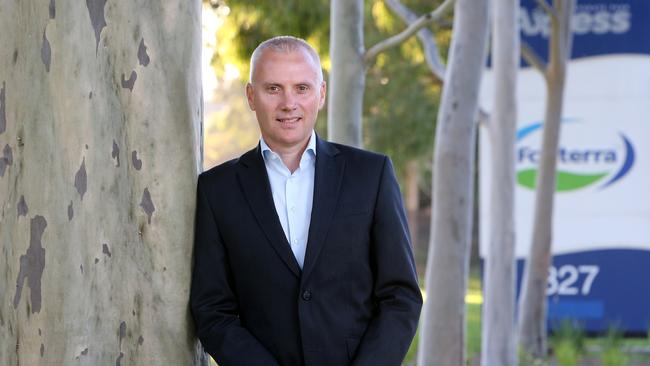
What should be the key issues in the next federal election campaign?
The most crucial issues our farmers and our business are facing are the drought and impact of high input costs, water security in the Murray Darling Basin, the need for a national energy policy, and continued pursuit of trade liberalisation, and these are the issues that all sides of politics should focus on leading up the next election.
What use are you making of customer and company data and how are you collecting it?
Fonterra has a presence in over 140 markets around the world, which gives us unique insight into global food trends. We’re able to leverage that market insight and our long-standing customer relationships to develop the dairy products our customers and consumers want.
What are the key challenges for your company next year?
With rising input costs and falling milk production due to the drought, there’s heightened competition for a smaller pool of milk in Australia. Coupled with increased milk production in New Zealand and the US, it means global milk supply is stronger relative to demand. We’ve undertaken a lot of work to improve our product mix and right-size our business to become more agile so that we’re better able to weather these storms, but it does mean remaining alert and maintaining our focus.
How can big business regain community trust?
Trust is built over a long time, and it comes from being consistent in what you say and do. For Fonterra, this means fronting up to our farmers, customers, and community, and listening to their concerns, and it also means being honest and open in return, even if it’s uncomfortable.
What cost pressures are hitting your company? How are they being offset and do you see any pressure to lift wages? If so how much?
Energy is one of our biggest operational costs, with a $1 increase in the commodity price of gas equivalent to a $1.8 million increase in our cost of production each year. We work with energy companies to negotiate for better deals where we can, and we also work to improve our energy efficiency to reduce our consumption.
-
Richard Deutsch | Deloitte
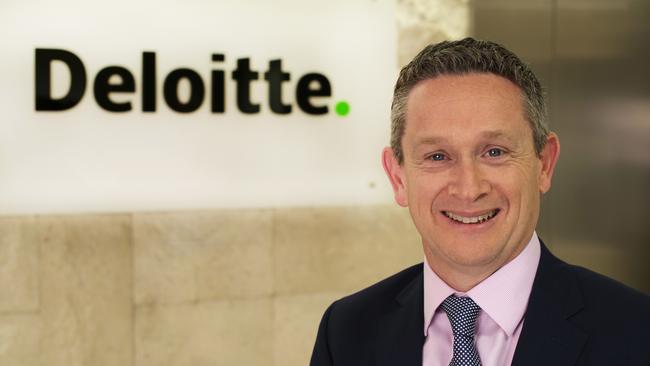
What should be the key issues in the next federal election campaign?
Focus on the issues that will sustain Australia’s enviable economic growth, maintain business confidence and public trust, don’t ignore tax reform; and place an emphasis on education, health, infrastructure, housing affordability and the environment.
What use are you making of customer and company data and how are you collecting it?
We view the custody of client and employee data as a privilege. Its confidentiality, privacy and protection are fundamental to how we deliver our services. Data we retain enables us to generate insights, solve new problems and make a positive impact for our clients like never before.
What are the key challenges for your company next year?
Maintaining growth in the light of:
- Helping business regain trust,
- Global trade issues,
- State and federal elections,
- Navigating regulatory developments both locally and globally; and
- Recruiting and retaining talent, particularly female talent in STEM related areas of our business.
How can big business regain community trust?
It’s about doing what you say you will do. It needs to be about profit with purpose. The community is demanding greater transparency, clear explanations of why decisions are made. There is a close alignment between the social licence of business to operate and its performance
What cost pressures are hitting your company? How are they being offset and do you see any pressure to lift wages? If so how much?
In areas of high demand such as cyber, technology and financial risks our own professional salaries will continue to rise. An expected return to real wages growth across the Australian economy will require some cost adjustment for all business. There will be continued pressure through greater regulatory costs and travel. however, technology is helping to offset their impact through the use of artificial intelligence to automate repetitive tasks and greater acceptance of virtual meeting technology.
-
Jeff Dimery | Alinta
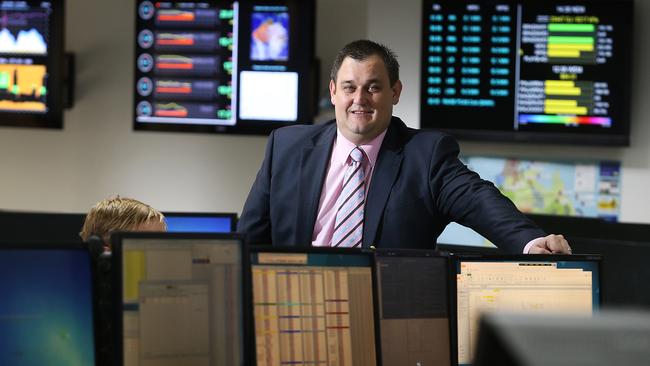
What should be the key issues in the next federal election campaign?
I think there are four key issues. Wages growth, energy (reliability, affordability, sustainability), infrastructure and tax reform. As far as infrastructure goes, our big cities are playing catch-up and the strain is clear. The Victorian election also gives you a sense that the electorate will reward delivery in this area. Energy is, as it has been at every election for the last decade and a half, still a case of landing a policy that provides certainty, helps us meet our international obligations, keeps a lid on prices and keeps the lights on. And we really need to see stagnant wage growth pick up to fuel the broader economy.
What use are you making of customer and company data and how are you collecting it?
Our customer data is probably underutilised (while being highly protected). We have plans to change that but right now we’re focused on the basics as a challenger brand – getting pricing right, ensuring our products are fair and transparent, and making sure we deliver great service. Customer data can be vital in some sectors, when it delivers you greater insights for product development and to deliver service that better suits the needs and wants of customers. But there can also be a tendency to overthink these things – particularly in energy. Lots of people turn up at conferences and talk about Uber and apps and pushing more and more information on our customers. But do our customers really want us pinging them every day to talk about their energy plan? Probably not.
The use of our company data is a different story. We have an annual $2 million innovation fund called Brightspark that we are using to back our employees’ ideas. A concept that won this year will apply data science, machine learning and AI principles to help us better forecast loads for customers of one of our power stations.
What are the key challenges for your company next year?
Navigating a challenging political and regulatory environment. Managing and sustaining our rapid growth and ensuring that we don’t have any own goals along the way.
Taking on incumbent businesses with considerable war chests and advantages, in a challenging political and regulatory environment. Building organisational muscle and expertise as we take on a greater role as developers and infrastructure project managers
How can big business regain community trust?
In the energy sector adopting the ACCC’s recommendations around price transparency (and greater transparency in general) will go a long way towards improving trust in the sector.
There also needs to be a better balance between the interests of customers, employees and shareholders. You can’t announce record profits year after year if customers and employees don’t feel like they’re also benefitting from the success of the company.
I also think we need to get the mix of promise and delivery right (which boils down to honesty). A lot of businesses create a sense that they’re operating at a vastly higher ethical level to the general community – with programs and media around sustainability, community involvement, diversity and a whole raft of other things. Then when you find out they’re overcharging customers or failing them in the most basic ways, that massive gap between expectation and delivery intensifies the community’s anger.
I’m not saying big businesses shouldn’t pursue these things, I’m saying before we hold ourselves up publicly as being better, different, leading or lily-white, we need to be 100 per cent confident we’re delivering on our promises for those closest to us – our employees, our customers and our communities.
What cost pressures are hitting your company? How are they being offset and do you see any pressure to lift wages? If so how much?
Intense competition has been challenging. That being said, we’ve led the way on pricing in many states and for significant periods of the last 12-24 months, which has fuelled our customer growth. It’s a hard balance to get right in energy, particularly with a lack of policy certainty and variable input/supply chain costs.
Our response has been to tightly manage our own costs. We’re scrutinising every single aspect of our supply chain and operating costs. We are lean and remain lean, and I can say with confidence there are no passengers at Alinta!
We’re not seeing pressure to lift wages that’s disproportionate to the greater economy.
-
Craig Drummond | Medibank
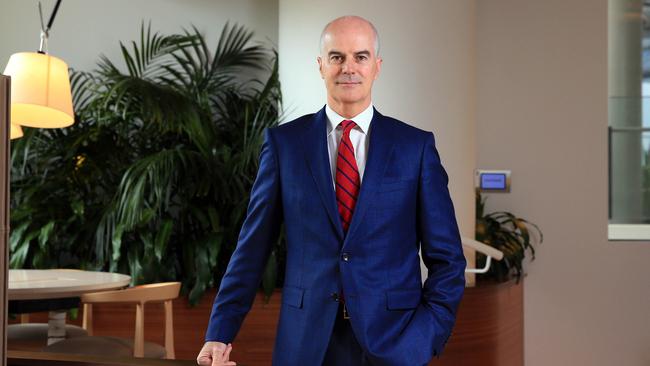
What should be the key issues in the next federal election campaign?
All political parties should be focused on ensuring a strong economy and delivering higher real wage and jobs growth. Australia has done well over the past quarter century or so and the country needs to look in a mature and considered way at the reforms necessary to ensure our standard of living continues to rise.
What use are you making of customer and company data and how are you collecting it?
Using analytics and predicative modelling of claims, administrative and publicly available data, Medibank is able to better predict customers with the highest risk of hospitalisation in the next 12 months. Insights enable us to identify Medibank customers who will benefit most from our chronic disease programs, supporting people in managing their own wellbeing and reducing the risk of hospital attendance or admission.
What are the key challenges for your company next year?
The challenge remains, as to how we can continue to deliver quality healthcare in Australia, at an affordable price. There is a big job ahead for all of us, if we are to ensure that the quality and affordability of the system is to be maintained for future generations. We’ve also seen more reform in private health insurance in the last 12 months than in the past 18 years – with six key reforms being implemented in 2019 we will undertake the biggest product build in Medibank and AHM history.
How can big business regain community trust?
Trust has been eroded in big business post the Global Financial Crisis. In restoring trust, organisations must do the right thing, do what they say they will do and do so with an uncomfortable level of transparency.
What cost pressures are hitting your company? How are they being offset and do you see any pressure to lift wages? If so how much?
Healthcare costs in Australia have been tracking at 4.6 per cent above inflation each year over the past 10 years, largely driven by more frequent, more expensive hospital admissions and a population that has typically been getting older and sicker. There can be little doubt, that rising costs such as these, have placed real pressure on our customers. In order to maintain the quality of the Australian health system, we all need to work harder to ensure that private health remains accessible to the 13.5 million private health insurance customers. This means looking at all parts of the health sector for long lasting opportunities to make the fundamental changes required to keep Australia’s health system a world leader. We are tackling this head on by cutting $60 million from our own management costs in three years to the end of the 2020 financial year and provide more affordable alternative (home and community) care settings.
Shayne Elliott | ANZ

What should be the key issues in the next federal election campaign?
Given I’m a New Zealander I don’t have a vote, however I expect economic management will be a key issue in next year’s election. Whoever is in power must provide a steady hand to steer the Australian economy through what may prove to be a challenging transition. While certainty across all policy areas is important, it’s equally important business gets on with the job regardless of what is going on in Canberra.
What use are you making of customer and company data and how are you collecting it?
We treat the security and safety of our customers’ data as a top priority, that’s actually a competitive advantage for a bank and an area where we do have a “trust” advantage. This will be even more important with the upcoming rollout of an open data regime. Our approach will be to use data to better serve our customers. An example is helping our customers better understand their household expenses when applying for loans.
What are the key challenges for your company next year?
The key challenge for the banking sector in 2019 will clearly be dealing with the outcomes of the Hayne Royal Commission. At ANZ, we are not waiting for the final report from Commissioner Hayne before taking action. In fact, the structural changes we have made to simplify our bank over many years leave us well placed to address the challenges the future holds. The simplification of our bank is even more important than ever.
How can big business regain community trust?
The first thing would be to do what we’ve said we’re going to do. Delivering on our promises, listening, learning and then explaining clearly to our customers, shareholders and other stakeholder why we are doing what we’re doing. Fixing issues quickly and fairly is also important. While we’ve made strong progress in improving our remediation processes and they continue to evolve, we know we have to continue to get better at identifying issues more quickly when they arise, communicating more clearly and reacting more rapidly to customers. Specifically in banking, the industry redrafted its Code of Banking Practice — it’s clear and bold and we need to all work hard to deliver on its promise.
What cost pressures are hitting your company? How are they being offset and do you see any pressure to lift wages? If so how much?
Rising energy costs and the potential for supply disruptions are not just an issue for our business but for household budgets. And it continues to be raised in meetings I have with our business customers. I understand the debate is often framed around choices — reduce carbon emissions or prices — but I believe we can do both. We cut our own energy use by identifying “low hanging fruit” like engineering improvements and also from more recent strategic purchases of renewable energy. We’ve actually been doing a pretty good job on costs. Our full-year result showed overall expenses and this positions us to better manage the headwinds facing the sector. We’ve also been doing our bit on wage growth for our staff covered by an enterprise agreement, with annual increases of 3 per cent for the past few years. At the senior levels however, variable remuneration has reduced significantly and was down around 20 per cent this year.
-
Francesco Ferrari | AMP
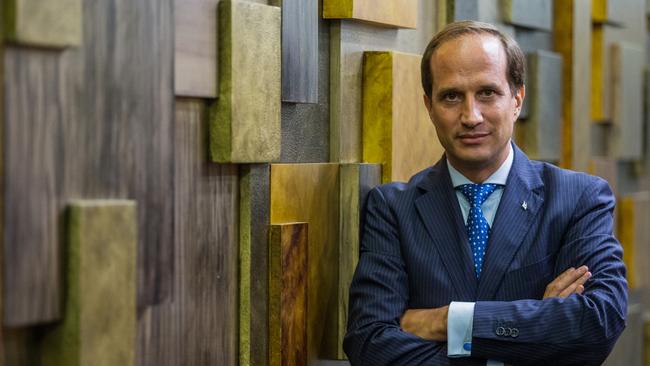
What should be the key issues in the next federal election campaign?
As I’ve only recently arrived in Australia, I am not in a strong position to judge. As a general comment, the public’s confidence in the government is an important outcome for any election. Regulatory stability and open, fair competition are what the business sector will always seek, and following the Royal Commission this year, the financial services sector in Australia definitely needs stability. The financial services sector is one of the largest employers here and a level and stable playing field is vital to attracting international investment. Having worked across Asia for the past seven years, I’ve seen that competition for international capital is intense.
What use are you making of customer and company data and how are you collecting it?
We are increasingly using data and analytics to improve the experience of customers. For example, in financial advice AMP is using analytics and detailed modelling to help customers more accurately forecast their retirement outcomes. I believe increasing use of data is a force for good, but you need to have the confidence of the customers to use it. Confidence will come from customers understanding how their data is used and the benefits it can bring. We collect data from various points of customer engagement, and ensure it is secured and protected in line with our regulatory and legal obligations for managing data.
What are the key challenges for your company next year?
AMP is in a rebuilding phase after a year of historic change in our company. We are already reviewing our strategy and business model and early next year we will have to adapt quickly to a new regulatory framework following the Royal Commission’s final report. The competitive landscape is also changing, particularly in wealth management, with several traditional competitors exiting. But I see these challenges as being in our hands, and we have several elements of strength. We have the largest financial advice network and are a key player in superannuation. We also have growing businesses in banking and investment management.
How can big business regain community trust?
The first point to acknowledge is that there is no magic fix. Trust is granted by the customer or the community, and we know that it is not easily won. At AMP, we are aiming to listen, respond to concerns, and focus on consistently delivering on our commitments. All businesses need to be realistic about their issues. Where mistakes have been made, address them and ensure they do not recur. To regain trust, the approach has to change; continuing with the same approach as before, and hoping the situation will improve, will not work.
What cost pressures are hitting your company? How are they being offset and do you see any pressure to lift wages? If so, how much?
We operate in competitive markets in each of our key businesses – wealth management, investment management and banking – and we’re committed to maintaining a cost base which enables us to compete. Our view of the Australian economy is that there will be limited real wage growth over and above inflation.
-




To join the conversation, please log in. Don't have an account? Register
Join the conversation, you are commenting as Logout